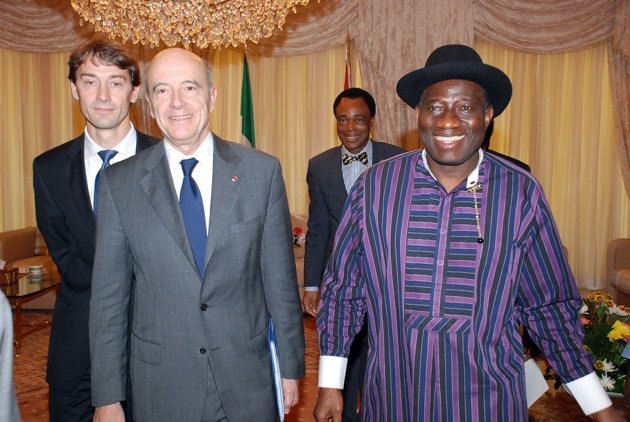This analysis was originally published by Lignet.com via http://www.lignet.com/
Nigerian President Goodluck Jonathan, right, and French Foreign Minister Alain Juppe at the presidential palace in Abuja on November 12, 2011. Juppe traveled to Nigeria to offer Jonathan assistance in fighting terrorism. After meeting with Jonathan, he visited Kano, the biggest city in Nigeria’s mainly Muslim north. (PHILIP OJISUA/AFP/Getty Images)
Nigeria: Oil Companies Increase Investment Despite Instability
Summary
Investment in Nigeria’s oil and natural gas industry continues to increase despite the threat of terrorism and a series of oil leaks in recent months. Nigerian President Goodluck Jonathan’s efforts to promote a good business climate has so far convinced major oil and gas companies such as Royal Dutch Shell (RDS), ExxonMobil (XOM), Chevron (CVX), Total SA (TOT), and Eni (E) to remain and expand their investments. General Electric (GE) has also recently signed an agreement to improve electricity generation and exploit Nigeria’s vast natural gas reserves.However, a natural gas leak forced French company Total SA to shut down its natural gas plant on April 3 until it can drill a relief well. This delay coupled with other recent oil spills highlights Nigeria’s aging energy infrastructure and could prompt foreign investment to slow.
Background
As Africa’s biggest oil producer, Nigeria had a March output of 2.14 million barrels per day of crude oil, according to Bloomberg. Royal Dutch Shell, ExxonMobil, Chevron, Total SA, and Italy’s Eni operate 90 percent of Nigeria’s oil reserves. Nigeriais also estimated to have the world’s eighth-largest gas reserves.
Although Nigeria is a top supplier of energy to the United States, its oil and gas industry faces several challenges. First, oil spills are a pervasive problem in southern Nigeria, and at least three major oil spills have occurred since 2010. These have prompted significant backlash and are in part due to Nigeria’s aging energy infrastructure.
Despite its huge oil and gas reserves, Nigeria faces critical shortages in electrical power generation. Nigeria flares off most of the large amounts of natural gas produced during oil production because it doesn’t have the capacity to capture it. The Nigerian government signed an agreement last month with General Electric for help in upgrading its power grid and natural gas infrastructure. Last week, Shell and Total announced they plan to increase their investments in Nigeria's domestic energy sector by several billion dollars. Jonathan estimates that Nigeria needs $10 billion per year in investments over the next ten years to meet its energy needs.
Corruption remains a key obstacle to reform and good management of the oil and gas industry. According to a parliamentary report, the state-run Nigerian National Petroleum Company (NNPC) used a fuel subsidy to siphon $6.8 billion from the government over a three-year period. Although Jonathan was unable to fully repeal the subsidy due to a public backlash, he has called for increased accountability and transparency of the NNPC.
Nigeria’s energy industry also has to contend with two significant militant groups, the Islamist Boko Haram in the north and the tribal Movement for the Emancipation of the Niger Delta (MEND) in the south. Although Boko Haram is a significant threat to the stability of Nigeria, MEND has the greater capacity to disrupt Nigeria’s economy due to its presence in the Niger Delta where much of Nigeria’s oil is found. MEND claimed responsibility for an attack on April 13 on a crude oil pipeline owned by Eni.
Analysis
Nigeria’s huge energy reserves continue to attract investment despite the threats posed by militant groups and corruption. A major reason for this is President Goodluck Jonathan, who has been successful in leveraging Nigeria’s substantial oil and gas reserves to ensure international investment continues.
Jonathan is targeting foreign oil companies that will likely benefit from improving the country’s natural gas and power infrastructure. Nigeria’s huge natural gas reserves are a major allure for oil and gas companies despite the current corruption and insecurity plaguing the country, which at this time appears to be at a level that these companies view as acceptable.
However, the intensifying campaign of violence both in northern Nigeria and the Niger Delta could lower investor confidence and lead to cutbacks in investment. MEND’s resumed campaign against foreign oil companies operating in the Niger Delta is a troubling development and is a huge threat to the nation’s aspirations to expand and improve energy production.
Conclusion
Despite a sizeable increase in militant activity in Nigeria, foreign companies remain committed to expanding their investments in its natural gas and power sector. However, growing levels of violent activity and corruption could lead these companies to reconsider their investments in the country. As a result, the government will probably expand its efforts to combat the militants and to improve the investment climate.
Alec Weisman is a graduate of Ecology, Behavior and Evolution from the University of California, San Diego, and an Analyst for LIGNET.com, the Langley Intelligence Group Network, a project of Newsmax based out of Washington, DC.
He writes from California, USA

